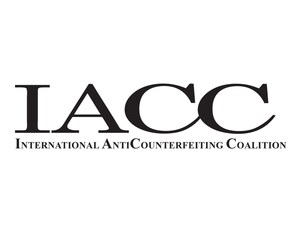
French Customs Signs Agreement with International AntiCounterfeiting Coalition (IACC)
IACC and French Customs combine forces to knock out rogue counterfeit merchants
PARIS, April 8, 2014 /PRNewswire-USNewswire/ -- This March, French Customs (DNRED) and the IACC, a Washington, D.C.-based non-profit organization committed to combating trademark counterfeiting and piracy, signed a Memorandum of Understanding (MOU) that enhances cooperation between the two organizations regarding the enforcement of trademarks and copyrights.
This unprecedented agreement will improve the ability of French authorities and the IACC to communicate, cooperate, and share information and resources, as well as further efforts in combating online counterfeit merchants via the IACC's RogueBlock™ program.
With retail e-commerce sales rising steadily over the past decade, the Internet provides an enticing platform for criminal merchants to sell counterfeit goods. The IACC's RogueBlock™ program uses a "follow-the-money" approach and provides a system for brand owners to report online sales of illegal counterfeit goods. By collaborating with the world's largest international payment brands, the RogueBlock™ program works to choke off funding to counterfeit merchants.
"The French National Intelligence and Investigation Directorate (DNRED) is heavily involved in the fight against counterfeit sales on the Internet, through its specialized department 'Cyberdouane,' says Director of DNRED, Jean-Paul Garcia. Facing a multiform threat that is constantly evolving and leading to dramatic effects for the economy, it is urgent to put an end to the feeling of impunity shown by smugglers on the Internet. An operational collaboration between French customs and the IACC will lead to a better efficiency as to disrupt and stop the activities of cyber-smugglers, on a global scale. It is a real chance to build very concrete and operational partnerships."
"IACC's partnership with French Customs demonstrates the significance of the counterfeiting problem on an international scale, and we are thrilled to join efforts on this issue," says IACC President, Bob Barchiesi. "Sharing assets and expertise is key to mitigating these insidious threats that put consumers at risk of receiving inferior and oft-times dangerous products. To date, thousands of criminal merchant accounts have been terminated through the IACC's RogueBlock™ program."
How you can avoid purchasing fakes:
- Price: If the price looks too good to be true, it probably is.
- Packaging: If the product is being sold without its packaging, or if the packaging appears to be of low quality or includes printing errors (e.g., blurry pictures, grammatical and spelling errors, and typos) it is probably counterfeit.
- Place: Consider where the product is being sold. Ask yourself if you would normally expect to find the product for sale in this environment. Deal only with legitimate, established merchants. If the professional-looking website includes poorly-written product descriptions (e.g., poor grammar and typos) and incomplete contact information, or has a no-returns or no-refunds policy, it is likely a counterfeit merchant.
About the IACC:
The IACC (www.iacc.org) is a Washington, D.C.-based not-for-profit organization representing the interests of companies concerned with trademark counterfeiting and copyright infringement. The members of the IACC include many of the world's best-known brands across all product sectors. The IACC is committed to working with government and industry partners in the United States and abroad to strengthen trademark and copyright protection, as well as by raising awareness for the range of harms caused by counterfeiting and piracy.
Photo - http://photos.prnewswire.com/prnh/20140408/DC01075
SOURCE International AntiCounterfeiting Coalition






Share this article